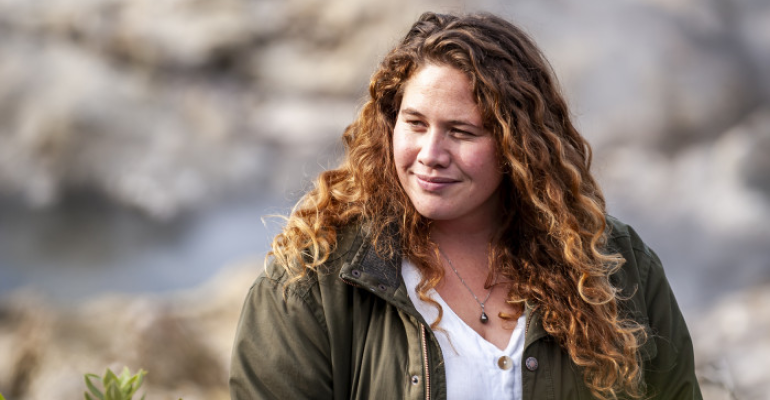Heni Unwin brings Mātauranga Māori to her research
19 September 2022 | Read time: 6 minutes

Science can be a lonely place for scarce Māori researchers who face constant demands for their time and input, and can feel uncomfortable working within the Western research paradigm.
Heni Unwin (Ngāti Tūwharetoa, Ngāti Kahungunu ki Wairoa, Rongomaiwahine, Ngāi Tūhoe, Te Atihaunui-a-Papaarangi) is a researcher and Vision Mātauranga lead for SfTI’s $5 million Precision Farming Technologies for Aquaculture Spearhead research project, which is developing remote technology to monitor marine aquaculture farms. The project is contributing to the government’s goal of achieving $3.6 billion of national aquaculture revenue by 2035.
Heni’s research focus is sensing mussel gaping behaviour.
“Gaping is when mussels open and close. They are usually open 80 to 90 percent of the time, and this is how they filter water to get their food and oxygen. When they detect a threat, such as pollution, high sedimentation, predators, or toxic algae, they shut and won’t open for a while.
“They can act as a sentinel species, saying that something is wrong in the ocean. So instead of looking at the chemical properties of the water or temperatures, we can gather information from the animal itself with non-invasive sensors.”

In 2022 we had the sensors tested in the ocean.
“The results were really interesting. Mussels close up when there’s lots of rain and toxins in the sea and during the experiment a storm came through and we could see when they closed up and how long for. This will help farmers who would normally have to keep going out and checking the mussels, but with our sentinel mussels, we were able to give minute-by-minute telemetry data, without physically going out to the beds.”
In her day job, Heni’s also a member of the Cawthron Institute’s Kāhui Āio with a particular focus on helping to implement Mātauranga Māori into science projects.
“The usual Western interface of ‘this is what I’m trying to do, and this is what I need from you’ doesn’t work with Māori,” Heni says.
“The usual Western interface of ‘this is what I’m trying to do, and this is what I need from you’ doesn’t work with Māori,” Heni says.
“You need to e huri o ringa ki raro – turn your hands to the soil, put your time and effort into doing the hard work first by understanding your Māori community, what’s important to them and how your research can help with problems they want to talk about.
She observes from her own current study toward a Master of Environmental Science that university can be isolating for Māori.
“We are in culturally unsafe environments. These institutions still don’t provide for Māori students. I am the only Māori in my classes, except for one class out of eight. I’m always coming from an indigenous perspective and it has made me an outlier and at some points even an educator about Māori culture.”
This strain on Māori researchers has been identified as the ‘cultural double shift’ in a study published by SfTI researcher Jarrod Haar and former SfTI Manager Vision Mātauranga and Capacity Development Impact Willy-John Martin. Their paper received attention from both the Science Media Centre and mainstream media.
SfTI holds that researchers’ human capacity (ability to influence, manage and collaborate) and relational capacity (ability to make and maintain networks with industry, Māori and researchers across disciplines) is just as important as their technical capacity and we invest in that ethos heavily and uniquely.
Between 2015 and 2021, we have offered 133 workshops, training, webinars, tailored classes and other non-science events to our researchers.
“I wouldn’t be in my role if it wasn’t for the National Science Challenges. They provide a platform for more Māori to be included in the science sector through the Vision Mātauranga policy. This policy has really brought to light the inequity of Māori in the science sector, but also the number of researchers who are not equipped to do kaupapa Māori research that benefits Māori communities.”

With SfTI’s support, Heni (left) also works with the Federation of Māori Authorities, and was selected to join a Māori Science and Innovation delegation to Australia in 2022. She has also benefitted from a pitching ideas workshop, kanohi ki te kanohi All SfTI Researchers’ workshop, Rangitahi Mission Lab, and Native American and Indigenous Studies Association workshop among other SfTI capacity development opportunities.
“SfTI not only supports you in work and capability-building, they have supported me in ensuring my wairua is uplifted by attendance at hui, wānanga and iwi events.”
SfTI Director Sally Davenport says Heni is worthy of every opportunity.
“We are proud and honoured to have this wahine toa in our midst.”
Title image courtesy of the Royal Society of New Zealand Te Apārangi.